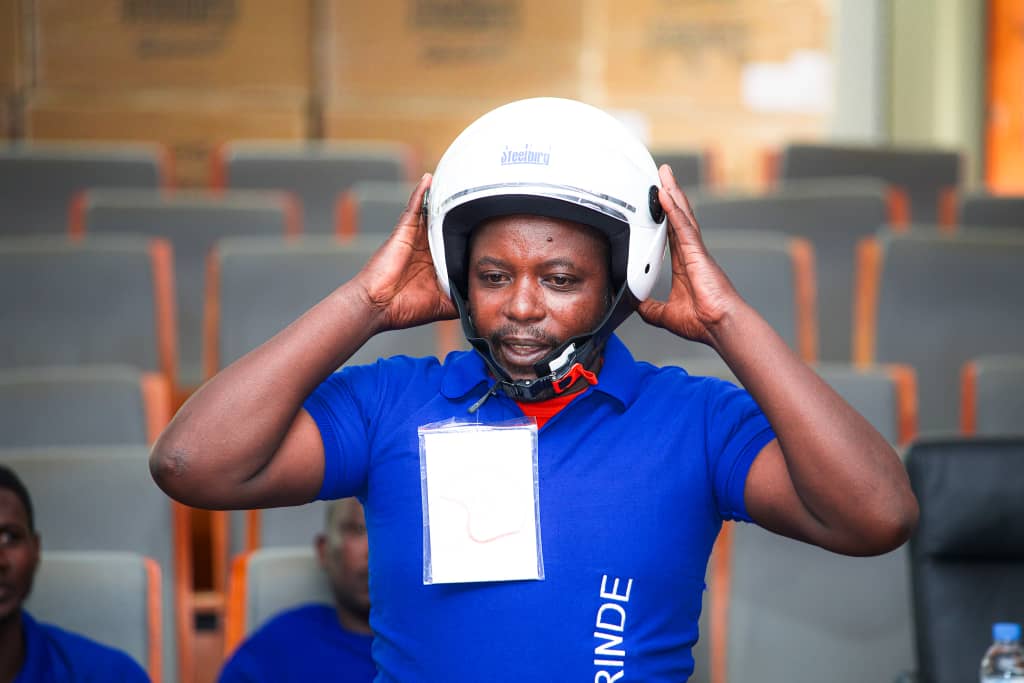Moto taxis are the most common and fastest mode of transport in Rwanda, but they also pose the highest risk for road accidents in a country experiencing rapid development.
According to the Ministry of Infrastructure, moto taxis account for half of all registered vehicles in Rwanda, contributing to a high number of fatalities annually, mainly due to the lack of proper safety gear such as helmets.
In the past four years, moto taxis have been involved in 20-30% of road accidents, resulting in 22-25% of the fatalities and 34-37% of the injuries.
Despite the requirement to wear helmets while riding motorcycles in Rwanda, at least 63 people have died from moto taxi-related accidents this year alone, primarily due to severe head injuries from substandard helmets, officials say.
In response to these alarming figures, Rwanda, in collaboration with the UN Road Safety Fund and Health People Rwanda (HPR), has launched a road safety campaign to replace all substandard helmets used by moto taxis with new UN-certified helmets that meet ECE-220 requirements.
Under this campaign, “Tuwurinde” (Protect the Head), 500 new certified safety helmets were distributed on May 27, 2024, to the best-performing moto taxi cooperatives in Kigali.
The new UN-certified helmets, which are scratch and impact resistant, are expected to reduce the risk of severe head injury by 69% and death by 42%, officials said at the launch event.

The launch, held in Kigali, was officiated by the United Nations Secretary-General’s Special Envoy for Road Safety, Jean Todt, and Rwanda’s Minister of Infrastructure, Eng. Jimmy Gasore.
Gasore announced plans to progressively replace all helmets currently used by moto taxi riders in the country within the next few years, alongside new regulations approving the type and standard of helmets entering the local market.
“As government, we want to ensure a process of making sure that these helmets are used and slowly replace the older ones,” Gasore said. For now, everyone is allowed to use any helmet, but we highly encourage moto taxi riders to adopt the safer helmets.
The Minister explained that until new directives on standards for certified safety helmets are issued, all certified helmets can be replaced with certified ones on the condition that the moto taxi operators return all their current helmets to the ministry.

Currently, all beneficiaries (moto taxi cooperatives) who return old helmets will receive new certified ones for free, but the Minister noted that in the future, they will have to buy the helmets, with plans to subsidize dealer purchase prices.
Rwanda National Police Spokesperson, ACP Boniface Rutikanga, said that the certified helmets will enhance the existing road safety campaign (Gerayo Amahoro) and further improve the safety of moto taxi users by guaranteeing protection for heads—a key aspect of the human body.
“As police we support this safety helmet campaign which is expected to reduce the number of moto taxi related deaths which are mostly caused by injuries to the head” Rutikanga said.
Kigali City Mayor, Samuel Dusengiyumva, also backed the initiative, stating that it will boost safety in the city as moto taxis are a high-risk factor for road accidents, despite their significant role in transport and economic activities.
“There is a need for the safety of millions of lives that use this mode of transport. Let security and safety be the norm in Kigali,” Dusengiyumva said.
Schmitz Nyarwaya, a moto taxi cooperative head, praised the quality of the new helmets, noting that they are not easy to break compared to the ones currently in use.
“The head is vital and irreplaceable, but these helmets look small compared to the ones our clients, especially women with a lot of hair, are used to, which means their safety could be compromised,” Nyarwaya said.

Other cooperative heads raised concerns about the need for helmet visors to be tinted to shield their eyes from the sun and called for reduced taxes on helmets to make them more accessible.
The Ministry of Infrastructure said these concerns would be addressed, with suppliers required to meet new standards set by the Rwanda Standards Board (RSB).
The Minister also explained that helmet retailers will be given an opportunity to sell their old stock, and once new directives are issued, they will be advised to import helmets that meet UN standards.
RSB Director General, Raymond Murenzi, said that new directives would be issued soon, and with UN funding, equipment has been purchased to test the quality of all new helmets entering the country. He also encouraged investors to establish a helmet manufacturing plant in Rwanda to support the new initiative.

UN Special Envoy for Road Safety, Jean Todt, who also met with President Paul Kagame and presented one of the helmets to the Head of State, said at the launch event that the UN is willing to support Rwanda’s campaign to promote safe helmets for all motorcyclists and passengers.
Todt said that the success of this campaign would enable Rwanda to meet road safety requirements and standards, aiming to ensure no one dies on the road.

